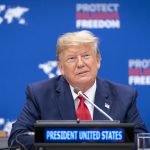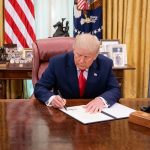In a stunning reveal at a news conference in Florida, President-elect Donald Trump put forth his bold vision for North America: using economic prowess to make Canada the 51st state. That’s right, in Trump’s eyes, the U.S.-Canada border is nothing more than an “artificially drawn line” that could use a little cross-border cooperation, or better yet, a permanent erasure. The prospect of melding two countries into one might raise eyebrows, but for Trump, the idea is as clear as his business acumen.
Let’s talk dollars and sense. According to Trump, the United States is shelling out an eye-watering sum of “hundreds of billions” every year to ensure Canada stays afloat, even when they’re spending their resources on maple syrup and beaver hats. Why should Americans foot the bill for their northern neighbor’s security when they can simply join the ranks? After all, if Canada can wean itself off the U.S. security teat, why not just adopt them outright and avoid the paperwork?
Sure, there’s a Canadian car industry, but Trump makes it clear that the U.S. car factories in Detroit are all the nation needs. Who needs those lumber exporters up north when America has ample timber? Clearly, Trump’s primary point is that self-sufficiency and American manufacturing could benefit if Canada became a state. That seems to be the sort of reasoning that keeps both his supporters and the Canadian Prime Minister, Justin Trudeau, scratching their heads.
Trump says America could annex Canada via economic forcehttps://t.co/TUbrXE0tYS pic.twitter.com/2QUc0GguLr
— The Washington Times (@WashTimes) January 7, 2025
Speaking of Prime Ministers, it’s always amusing to think about how Trudeau must feel when addressed as “governor” in Trump’s mind. One has to wonder how many times the Canadian officials can politely reject the notion of statehood before losing all sense of decorum. After all, the message is as clear as it gets: the goal is not only mutual benefit but also a full-blown political annexation, and they’re not having it.
As Trump charges ahead with these ideas that meld humor and economics, perhaps he’s on to something tongue-in-cheek—or perhaps he’s just making a point about the complexities of cross-border relationships. Whatever the case, it’s hard not to chuckle at the thought of the Maple Leaf officially taking its place on the Star-Spangled Banner. With just a few strokes of his executive pen, who knows what might just happen?




